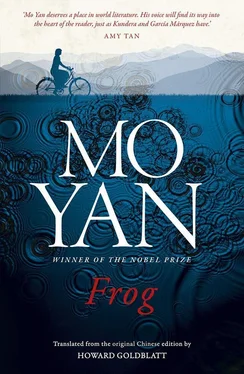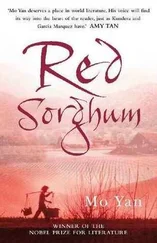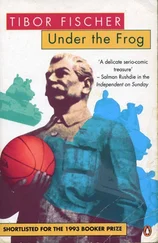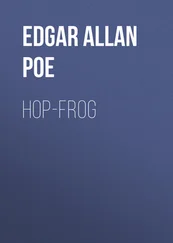Sensei, the waiter gave the impression of bowing without actually doing so. Welcome, he said. The great knight Don Quixote’s loyal retainer, Sancho Panza, here to serve you. He handed me a bill of fare in ten languages.
Thank you, I said. The usual. A margarita salad, a can of Little Widow Antonia stewed beef, and an Uncle Malik dark ale.
He waddled off like a duck. While I waited for my food I scrutinised the interior decorations. The walls are hung with a rusted helmet, a lance, and tattered gloves worn during a duel with a romantic rival, all symbols of celebrated battle skills, and certificates and medals for colossal achievements. Also on the wall are a remarkably lifelike deer’s head, a pair of brightly feathered pheasants and some yellowed photos. Even though the decorations are imitations of a classical European style, the layout is not without its appeal. The bronze, life-size statue of a woman stands to the right of the entrance, her breasts rubbed shiny by human hands. I’ve kept my eye on it, Sensei, and every diner, male or female, brushes one of those breasts upon entering — The Fertility Goddess Temple square is always a hub of activity, and Wang Gan’s hawking shouts are the loudest and liveliest. A new program has gotten underway recently, called Unicorns Deliver the Babies, ostensibly to return to traditions, whereas in fact it is the creation of a couple of workers at the municipal cultural centre. Though it’s a patchwork scheme, neither domestic nor foreign, it has resolved the employment problem for dozens of people, which makes it worthwhile. Beyond that, Sensei, just as you have said, tradition starts out as artistic innovation. I’ve seen any number of similar programs on TV, hodgepodges of tradition, the modern, travel and culture, bustling with activity, bright and glitzy, radiantly joyful, friendliness that brings wealth. And, in line with your worries, the flames of war leave bodies strewn across the land in some place, while singing and dancing take place in others, along with debauchery. This is the world you and I live in. If there really were a giant who was as much larger than the earth as we are to a soccer ball, I wonder what he would be thinking as he circled the planet, where peace is followed by war, overabundance by starvation, droughts by floods… Sorry, Sensei, I’ve let myself get sidetracked.
The phoney Sancho brought me a glass of ice water and a plate of bread with a pat of butter, plus a little dish of virgin olive oil with garlic-infused soy sauce. Their bread is beautifully baked; everyone says it is. Dipping it in the sauce is a treat in itself, but that is followed by delicious entrees and soups — Sensei, you must come have a meal here; I guarantee you’ll like everything about it — and the restaurant has a tradition, actually, more a ‘custom’ than a tradition: just before closing each night, the day’s leftover bread — in a variety of shapes, colours and thickness — is placed in a willow basket at the entrance, free for anyone. Nowhere does it say that they should take only one loaf, but that’s what everyone does instinctively. They stroll the grounds of the temple grounds with fresh loaves tucked under their arms or hugged to their chests — long or square, soft or fragrantly blackened, inhaling the fragrance of wheat, flax, almonds and yeast — their own bread. Sensei, this has always moved me deeply. I know, of course, that this may be an immoderate feeling, because I am painfully aware that the world is filled with people who lack clothes to wear and food to eat, plus some for whom survival is a constant struggle.
The margarita salad is a fresh, tasty dish with lettuce, tomato and endive. Who came up with such a romantic European name for a salad? One of my classmates, of course, and my first teacher’s son — Li Shou. As I wrote to you in another letter, he was the most talented student in our group, and he should have been the one with a literary career, but that turned out to be me. He became a skilled doctor and had a brilliant future ahead of him until he gave it up and came back home to open this restaurant, which is a cross between Chinese and Western, or better described, one that is both Chinese and Western. The influence of literature on this old classmate of ours is evident in the name of his restaurant and the dishes he serves. Opening a café called Don Quixote in a place that has traces of both local and foreign influence was in itself quixotic. He carries his success around his middle. Short to begin with, all that weight makes him seem even smaller. He sits in the far corner to watch me across the floor, and neither of us so much as waves to the other. I sometimes sprawl across the table to scribble some impressions, and he sits in a strange, leisurely pose, with his left arm over the back of the chair, resting his chin in his right, for the longest time.
The waiter brought my order — Little Widow Antonia beef and Uncle Malik dark ale — to the table. I took a drink, ate a bite, and slowly savoured both as I gazed out the window at a sombre re-enactment of a fairytale playing out in broad daylight: loud drumbeats and music leading the way, followed by flags and banners, umbrellas and fans and ostentatious outfits on extraordinary characters: a woman sitting atop the unicorn, her face like a silver plate, eyes like bright stars, holding a chubby pink infant. The Fertility Goddess always reminds me of Gugu, though in reality, Gugu dresses in a baggy black robe, her hair is like a bird’s nest, and she has a laugh like an owl’s hoot, a glassy look, and incoherent speech; that effectively kills the illusion.
After being carried around the square, the goddess’s flags lined up in formation in the centre. The musicians put down their instruments to allow an official in a high hat and crimson robe, holding a tablet in front of his chest — his stature starkly reminiscent of a eunuch in an imperial drama — to read from a yellow scroll: Great Heaven and Sovereign Earth produce the world’s five grains; the sun, the moon and the stars nourish the multitudes. In the name of the Jade Emperor, the Fertility Goddess brings a sweet baby down to Gaomi. I hereby call the pious couple, Wang Liang and his wife, to come forward for their baby — but before the couple playing the husband and wife received their son, a clay doll, it was snatched away by a woman eager to have one of her own.
Sensei, though I console myself with many rationalisations, I am at heart a coward, a little man who worries about nearly everything. Since coming to grips with the reality that the girl Chen Mei is carrying my child, a powerful sense of transgression has weighed me down. Gugu and Little Lion took Chen Mei in as a baby, I even helped out by preparing formula for her. She is younger than my own daughter. One day, when Chen Bi, Li Shou and Wang Gan, all childhood classmates, learn the facts of what occurred, I will no longer be able to look any of them in the eye, even if I were to cover my head with a dog’s pelt.
I thought back to my two encounters with Chen Bi since my return.
The first was on a snowy evening last year. Little Lion hadn’t yet started work at the bullfrog farm, and we were strolling through the snow, watching snowflakes dance in the glare of golden yellow lights around the square. Firecrackers popped somewhere in the distance; it was getting to feel very much like New Year’s. We were talking to our daughter, who was off in Spain. She said she and her husband were strolling the streets of Cervantes’ hometown. I told her that by chance Little Lion and I were walking into the Don Quixote café, which evoked crisp laughter on the other end of the cell phone.
It’s a small world, Papa.
Culture is everywhere, Sensei.
At the time we didn’t know that Li Shou was the owner, but we sensed that whoever it was, he was no ordinary man. We liked the place as soon as we walked in. The simple, unadorned tables and chairs particularly impressed me. Covering the tables with clean, white, neatly starched tablecloths would have made it very European. But I agreed with Li Shou, whose later research showed that rural Spanish restaurants in Don Quixote’s day did not use tablecloths. He added the gossipy comment that women back then did not wear bras either.
Читать дальше












